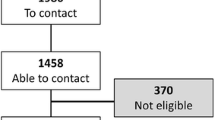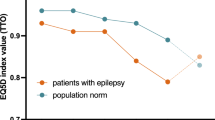Abstract
The Liverpool Seizure Severity Scale (LSSS) and the Liverpool Quality of Life (LQOL) battery were developed in Great Britain to assess the severity of seizure symptoms and the impact of epilepsy on patients' quality of life. The scales have been validated on British patients, but have not been validated for use with American patients. The objectives of this study were to adapt the scales to the American population and to evaluate their reliability and validity. After modifications recommended by focus groups with patients and epilepsy specialists, the scales were administered to a sample of 90 epilepsy patients who had experienced seizures within the previous 4 weeks. Comparisons of patients with generalized tonic-clonic seizures (n=58) and partial seizures (n=32) revealed significant differences on 9 of the 20 items on the LSSS as well as the total score. None of the six LQOL subscales (negative drug effects, positive drug effects, affect balance, sense of mastery, life fulfilment and impact of epilepsy) distinguished patients with different seizure types but five of the six subscales were significantly correlated with seizure severity. The internal consistency and test-retest reliability were adequate for both the LSSS and LQOL. Finally, five of the six LQOL scales were significantly correlated with independent measures of mental health, physical health and role functioning.
Similar content being viewed by others
References
Annegers JF. Epidemiology and genetics of epilepsy. Neurologic Clinics 1994; 12: 15-29.
Dodrill CB, Beier R, Kasparick M, Tacke I, Tacke U, Tan SY. Psychosocial problems in adults with epilepsy: comparison of findings from four countries. Epilepsia 1984; 25: 176-183.
Collings JA. Psychosocial well-being and epilepsy: an empirical study. Epilepsia 1990; 31: 418-426.
Ryan R, Kempner K, Emlen AC. The stigma of epilepsy as a self-concept. Epilepsia 1980; 21: 433-444.
Schneider JW, Conrad P. In the closet with epilepsy: epilepsy stigma potential and information control. Soc Problems 1980; 28: 32-44.
The Roper Organization. Living with Epilepsy: Report of a Roper Poll of Patients on Quality of Life. New York; The Roper Organisation, 1992.
Rimmer RM, Richens A. Clinical pharmacology and medical treatment. In: Laidlaw J, Richens A, Oxley J, eds. A Ttextbook of Epilepsy. Edinburgh: Churchill Livingstone, 1988: 421-483.
Leppik IE. Contemporary Diagnosis and Management of the Patient withEpilepsy. Newtown, PA: Handbooks in Health Care, a division of AMM Co., Inc., 1993.
Dodrill CB, Batzel LW, Queisser HR, Temkin NR. An objective method for the assessment of psychological and social problems among epileptics. Epilepsia 1980; 1: 123-135.
Langfitt JT. Comparison of the psychometric characteristics of three quality of life measures in intractable epilepsy. Qual Life Re 1995; 4: 101-114.
Vickrey BG, Hays RD, Graber J, Rausch R, Engel J Jr, Brook RH. A health-related quality of life instrument for patients evaluated for epilepsy surgery. Med Care 1992; 30: 299-319.
Ware JE, Sherbourne CD. The MOS 36-item Short-Form Health Survey (SF-36): I. Conceptual framework and item selection. Med Care 1992; 30: 473-483.
Devinsky O, Vickrey BG, Cramer J et al. Development of the quality of life in epilepsy inventory. Epilepsia 1995; 36: 1089-1104.
Hays RD, Vickery BG, Herman BP et al. Agreement between self-reports and proxy reports of quality of life in epilepsy patients. Qual Life Research 1995;4: 159-168.
Baker GA, Smith DF, Dewey M, Jacoby A, Chadwick DW. The initial development of a health-related quality of life model as an outcome measure in epilepsy. Epilepsy Res 1993; 16: 65-81.
Baker GA, Jacoby A, Smith DF, Dewey ME, Chadwick DW. Development of a novel scale to assess life fulfillment as part of the further refinement of a quality-of-life model for epilepsy. Epilepsia 1994; 35: 591-596.
Bradburn NM, Caplovitz O. Reports on Happiness: A Pilot Study of Behavior Related to Mental Health. Chicago, IL: Adine, 1965.
Pearlin LI, Schooler C. The structure of coping. J Health Soc Behav 1978; 19: 2-21.
Jacoby A, Baker G, Smith D, Dewey M, Chadwick D. Measuring the impact of epilepsy: the development of a novel scale. Epilepsy Res1993; 16: 83-88.
Smith D, Baker G, Davies G, Dewey M, Chadwick DW. Outcomes of add-on treatment with lamotrigine in partial epilepsy. Epilepsia 1993; 34: 312-322.
Smith D, Baker GA, Jacoby A, Chadwick DW. The contribution of the measurement of seizure severity to quality of life research. Qual Life Res 1995; 4: 143-158.
Baker GA, Smith DF, Dewey M, Morrow J, Crawford PM, Chadwick DW. The development of a seizure severity scale as an outcome measure in epilepsy. Epilepsy Res 1991; 8: 245-251.
Smith DF, Baker GA, Dewey M, Jacoby A, Chadwick DW. Seizure frequency, patient-perceived seizure severity and the psychosocial consequences of intractable epilepsy. Epilepsy Res 1991; 9: 231-241.
Smith D, Chadwick D, Baker G, Davis G, Dewey M. Seizure severity and the quality of life. Epilepsia 1993; 34(suppl 5): S31-S35.
Andrews FM, Robinson JP. Measures of subjective well-being. In: Robinson JP, Shaver PR, Wrightsman LS, eds. Measures of Personality and Social Psychological Attitudes. New York: Academic Press, 1991: 61-114.
Author information
Authors and Affiliations
Rights and permissions
About this article
Cite this article
Rapp, S., Shumaker, S., Smith, T. et al. Adaptation and evaluation of the Liverpool Seizure Severity Scale and Liverpool Quality of Life battery for American epilepsy patients. Qual Life Res 7, 467–477 (1998). https://doi.org/10.1023/A:1008834710146
Issue Date:
DOI: https://doi.org/10.1023/A:1008834710146




